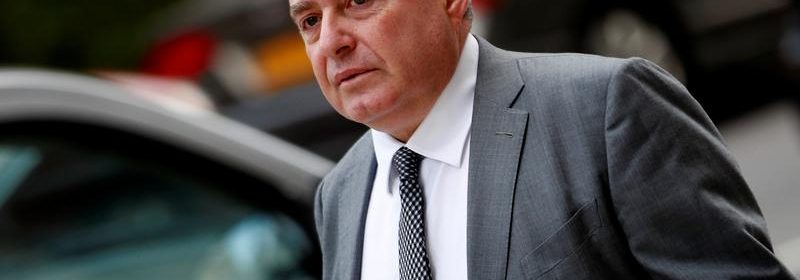Ex-Giuliani associate Parnas found guilty of violating U.S. campaign finance law

NEW YORK (Reuters) -Lev Parnas, a onetime associate of Donald Trump’s former personal lawyer Rudy Giuliani, was found guilty on Friday of violating U.S. campaign finance laws during the 2018 elections.
Parnas, a Ukraine-born American businessman, and his former associate Igor Fruman had been accused of soliciting funds from Russian businessman Andrey Muraviev to donate to candidates in states where the group was seeking licenses to operate cannabis businesses in 2018.
Parnas also concealed that he and Fruman, who pleaded guilty in September, were the true source of a donation to a group supporting Republican then-President Trump, prosecutors said. Giuliani’s attorney has said the Parnas case is separate from a probe into whether violated lobbying laws while representing Trump.
Giuliani, a U.S. prosecutor in the 1980s before he was elected New York’s mayor in 1994, has not been charged with any crimes and denies wrongdoing.
Parnas was found guilty on all six counts of federal election law violations that he faced, which included illegally helping a foreigner contribute to a U.S. election campaign, making contributions in the names of others, and lying to the Federal Elections Commission (FEC).
Andrey Kukushkin, a Muraviev associate and California resident who was tried alongside Parnas, was found guilty on Friday of two counts of campaign finance violations. Kukushkin is also a Ukraine native.
The trial in U.S. District Court in Manhattan has drawn attention because of the role Parnas and Belarus-born U.S. citizen Fruman played in helping Giuliani, who was Trump’s personal attorney while he held office, to investigate Democrat Joe Biden during the 2020 presidential campaign. Biden won the election, denying Trump a second term.
Parnas, dressed in a blue suit, stared straight at the jury as the verdict was read. Kukushkin, wearing a grey sweater, shook his head after he was pronounced guilty on the second count.
“I’ve never hid from nobody,” Parnas said as he left court wearing a black “Combat COVID” mask. “I’ve always stood and tried to tell the truth.”
His attorney Joseph Bondy said they would be filing a motion to vacate the verdict “in the interest of justice.”
“It’s obviously a very difficult time for Mr. Parnas and his wife and his children,” Bondy said.
U.S. District Judge J. Paul Oetken denied a request from prosecutors to detain Parnas and Kukushkin. “The defendants have sufficiently established that they’re not a risk of flight,” Oetken said after the jury left.
Oetken set a sentencing date of Feb. 16 for Kukushkin. He did not set a sentencing date for Parnas, who faces another possible trial on separate fraud charges.
‘IN WELL OVER HIS HEAD’
The case provided a glimpse into the inner workings of political fundraising in the United States.
“You saw the wires from Muraviev,” Assistant U.S Attorney Hagan Scotten told the jury during closing arguments on Thursday. “You saw how that money came out on the other side, finding its way into American elections, where the defendants thought they had bought influence to further their business.”
Parnas’ defense lawyers countered that Muraviev’s funds went toward business investments, not campaign contributions, and that the donation to the pro-Trump group was from a company founded by Parnas and broke no laws.
In his closing statement Parnas attorney Bondy characterized his client as a passionate proponent of marijuana legalization who was “in well over his head.” He argued that Muraviev’s money funded business operations, not campaign contributions.
Deliberations in the trial began on Friday morning and lasted about five hours.
Fruman, who lives in Florida, pleaded guilty to one count of soliciting campaign contributions from a foreign national. His sentencing is scheduled for Jan. 21.
Parnas and Kukushkin had faced two counts of conspiring to make donations from a foreign national, and making the donations. Parnas had also been charged with four other counts, including making false statements to the Federal Elections Commission.
Source: Read Full Article
